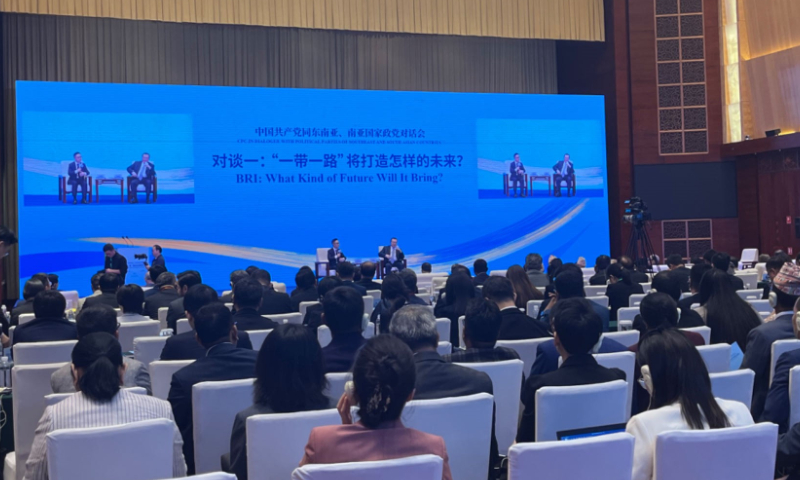
An open dialogue about the Belt and Road Initiative is held on Friday in Kunming, Southwest China’s Yunnan Province. Photo: Zhang Changyue/GT.
The issue of debt is not really a problem in the Belt and Road Initiative (BRI) as China has means and ways of easing it, and is not making things difficult, said a senior Chinese official in a dialogue on Friday attended by more than 150 officials, political party leaders and scholars from 18 countries in Southeast and South Asia.
"For example, China will never chase the African countries to pay back debts. African countries do not complain that China is creating debt for them. Instead, they welcome China's loans, funding and financial support, which means so much for the improvement of people's living standards," said Liu Jianchao, head of the International Department of the Communist Party of China (CPC) Central Committee. Liu was speaking on Friday morning, after representatives from the Philippines, India, Pakistan and Nepal shared their views and concerns over the BRI.
Choosing the city of Kunming in Southwest China's border province Yunnan as the event location, the International Department invited guests from countries including Vietnam, Thailand, Laos, Myanmar, Cambodia, Malaysia, Singapore, the Philippines, Indonesia, and Brunei, as well as India, Nepal, Bhutan, Pakistan, Bangladesh, the Maldives and Sri Lanka. The dialogue is aimed at boosting future cooperation under the BRI.
Through the BRI, China is trying to provide sustainable public assets that target ordinary people's true needs and interests. The initiative is open to all countries, including the US, Australia, Japan, South Korea and European countries, Liu emphasized.
John Ross, former director of economic and business policy for the Mayor of London, was also invited to the event. He told the Global Times that compared with Europe, which is currently suffering low economic growth, severe inflation and disastrous conflict, Asia has a combination of peace and the most rapid economic development in the world. The BRI is a key underpinning of that, he said.
"If southeast Asia is the most rapidly growing area outside of China, then Yunnan is the perfect geographical link," Ross said.
Besides the Friday open dialogue, high-level meetings were held between Chinese and foreign officials to explore future cooperation prospects.
"I have met with Wang Yubo, the governor of Yunnan Province, and people in charge of Yunnan Energy Investment Group this afternoon to discuss the potential for cooperation, as the clean energy aspects of the BRI align with the clean energy policies proposed by our government," Pirapan Salirathavibhaga, deputy Prime Minister of Thailand and leader of the United Thai Nation Party, told the Global Times on Thursday evening.
When asked about the construction situation of the Thailand-China high-speed line, Pirapan said the Thai government is committed to promoting the project and is working to address problems such as land acquisition issues, given that some Thai people are worried about the impact on their farmland and on the residents living near the route.
Three seminars were also held at Yunnan Academy of Agricultural Sciences, Yunnan University and Yunnan Minzu University on Thursday morning. Chinese scholars shared experiences and discussed cooperation prospects with the foreign guests in areas such as agriculture, the environment and talent cultivation.
Madhav Kumar Nepal, former prime minister of Nepal and chairman of the Communist Party of Nepal, told the Global Times that he was impressed by Yunnan's agricultural development, after hearing professors from Yunnan University introduce the restoration of plateau lakes, the cultivation of distinctive green plants to support poverty alleviation in border mountain areas, and the technology for cultivating perennial rice.
"Nepal also has abundant natural resources and can get more benefit from the experiences of China on how to develop our water resources, and how to develop agricultural products," said Nepal.
Wang Ning, secretary of the CPC Yunnan Provincial Committee, vowed to deepen cooperation in rural industry and rural construction to support regional poverty reduction and to keep improving roads, railways, aviation and water transportation to facilitate the flow of people and goods.
"Southeast and South Asian countries have rich agricultural, energy, and tourism resources that complement our strengths. We are willing to cooperate with countries to develop cross-border agriculture, cross-border tourism, and clean energy, and to strengthen international ecological environmental protection," said Wang.
